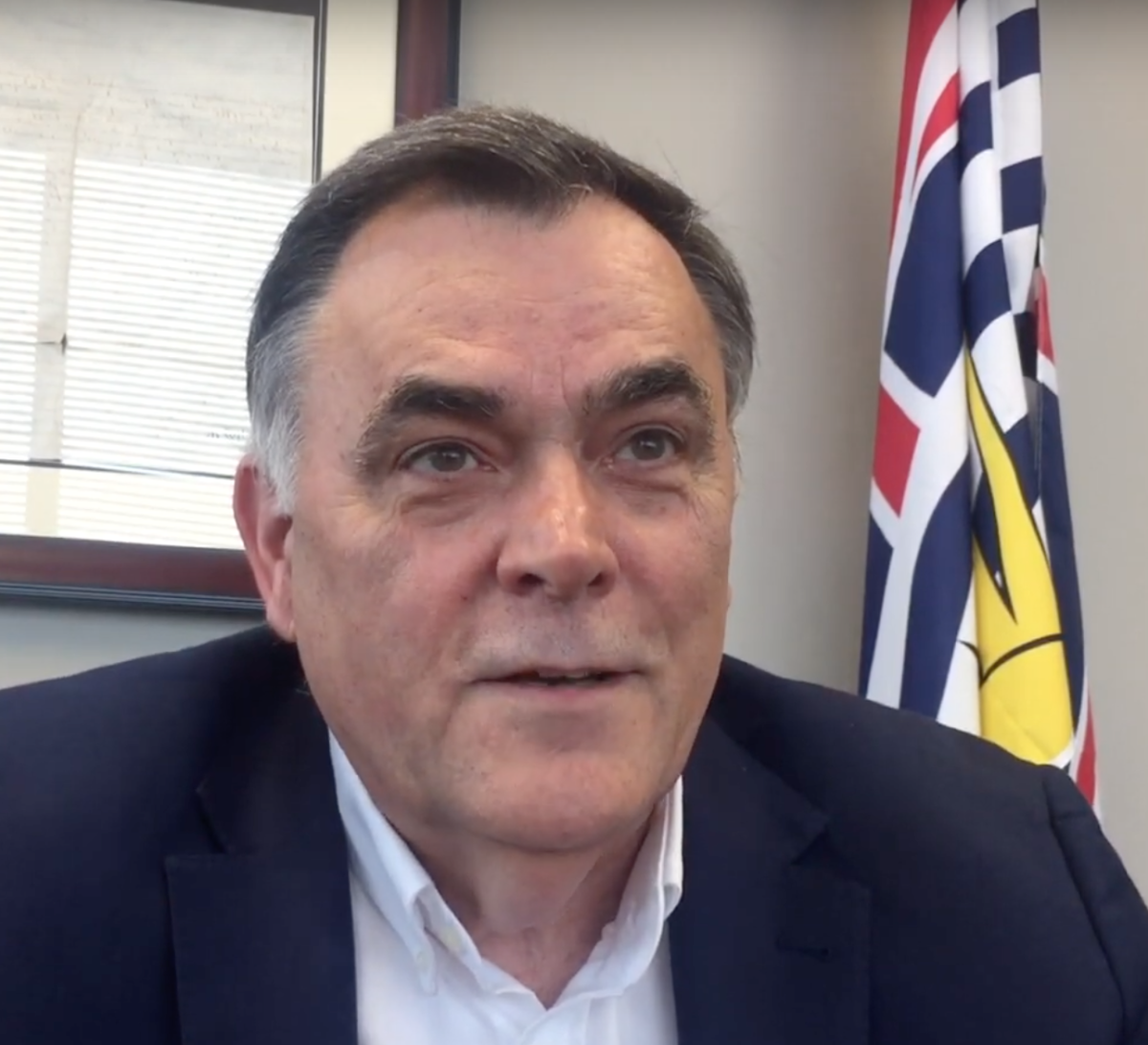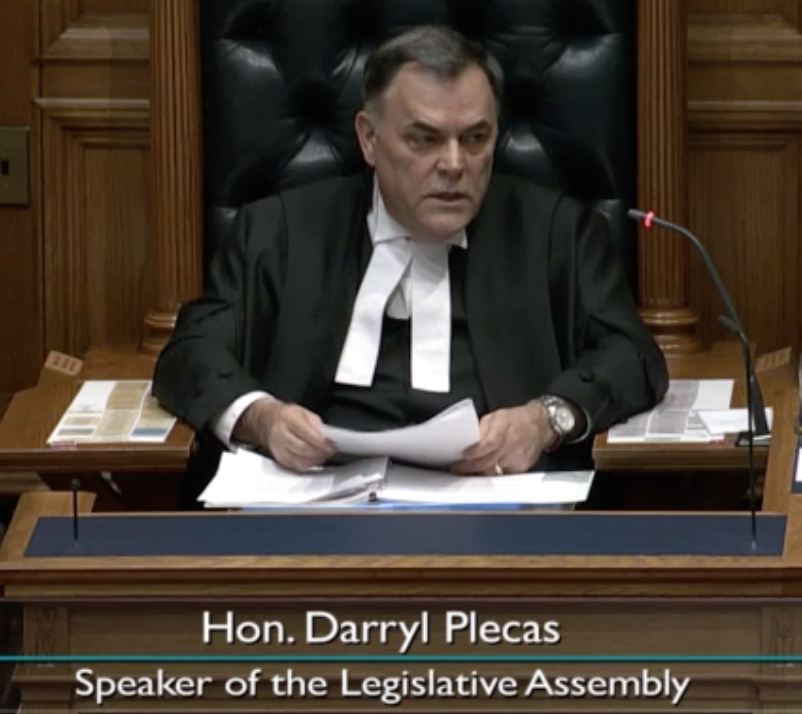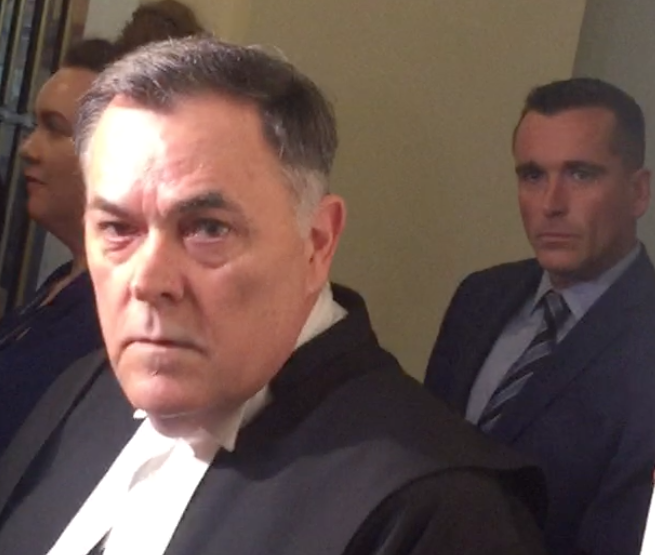
Bob Mackin
The former Speaker of British Columbia’s Legislative Assembly is calling on lawmakers to push for change and continue his quest to end corruption.
Darryl Plecas released a 50-page report, called “Unfinished Business,” on Dec. 11 to summarize his three years as Speaker and recommend reforms. The report recounts his ups and downs as referee in the seat of government and the loose ends left when Premier John Horgan called an election a year earlier than required.

Speaker Darryl Plecas arrives on Throne Speech Day Feb. 12, 2019 (BC Gov)
Plecas called his tenure “eventful and interesting.” It was an era marked by the criminal investigation of and retirements in disgrace by the Clerk and Sergeant-at-Arms (criminal charges are pending) and adoption of a laundry list of new or revised policies to modernize the 122-year-old workplace.
“I have always said that, in order to clean up the Legislative Assembly, it is necessary to take an honest, unblinking look at what happened – certainly more than the cursory glance that has been cast over these matters, to date. And we can’t cherry pick a bit of the low-hanging fruit (“Wood Splitter! Missing Alcohol!”) and declare the job done,” Plecas wrote. “Those are examples of the underlying problem, but dealing with them does not solve the problem itself. There is work still to do. I continue to think these issues are important and deserve attention. I call on all Members of the new Parliament to push for action on these issues, and to continue my campaign to clean up British Columbia’s Legislature.”
Plecas, a professor emeritus of criminology at the University of the Fraser Valley, was elected the BC Liberal MLA for Abbotsford South in 2013, re-elected in May 2017 and was acclaimed Speaker in September 2017. The Green-supported NDP minority came to power after it defeated the BC Liberals in a confidence vote in June 2017. The BC Liberals ejected Plecas from the party in revenge for sparking ex-Premier Christy Clark’s resignation at a Penticton caucus retreat.

Speaker Darryl Plecas on April 10 (Hansard)
“I did not set out to be a ‘reforming’ Speaker. When I started in the role, I didn’t have any depth of knowledge as to what it involved. But as many people have now read, in the reports I published in January and February 2019, I soon observed a lot of practices which did not seem right to me. I saw an entrenched culture of entitlement and greed. And I saw how partisanship, once it got into the bones of a place, can taint offices that ought to be in the service of all parties, and all members.”
“Rhinoceros skin”
In the report, Plecas wrote about finding resistance around every corner, from disappearing documents and data and political backstabbing to unfair media coverage and archaic practices. Indeed, Plecas wrote, he developed what Hillary Clinton called “rhinoceros skin” after experiencing relentless invective, mudslinging and indifference. “We can take it.”
For instance, Mary Polak, the BC Liberal house leader, supported funding for chief of staff Alan Mullen’s 2019 trip to examine security costs at legislatures in Canada and the U.S. Then, when Mullen departed, Polak and BC Liberal leader Andrew Wilkinson complained to the media. BC Liberal MLA Jas Johal ridiculed the exercise as “Alan Mullen’s excellent summer adventure.” The early 2020 report eventually recommended ways to save millions of dollars and sparked the hiring of a former Vancouver Police Deputy Chief to study next steps on replacing the Legislative Assembly Protective Services police department with a security department.
“The response by the BC Liberals to every step I took over the past two years was quite obviously coloured by their personal animus towards me. But who does that benefit, ultimately, if a party’s dislike of one individual takes precedence over an interest anyone in their caucus might have had in taking on matters so obviously of public importance? I know who it hurts – every British Columbian taxpayer. At the same time, I was surprised and heartened by how many people did support my efforts.”
The animus intensified after the Nov. 20, 2018 suspension of Clerk Craig James and Sergeant-at-Arms Gary Lenz, the revelation of an RCMP investigation with two special prosecutors and Plecas’ reports that revealed some of their corruption. Evidence showed James was closely aligned with the BC Liberals, who appointed him in 2011 rather than leaving the job to the traditional all-party committee.
Plecas was perturbed by the way house leaders Mike Farnworth (NDP), Sonia Furstenau (Green) and Polak allowed James to retire in May 2019 without repaying the $260,000 retirement allowance he created for himself, despite it being one of the misconducts identified by retired Supreme Court Chief Justice Beverley McLachlin in her report.

Gary Lenz (left), ex-speaker Linda Reid and Craig James (Commonwealth Parliamentary Association)
“I found the decision staggering. I have no idea what leverage Mr. James could have possibly had to compel a ‘settlement’, or indeed, what notional claim he might have been ‘settling,’ against the Legislature. The ‘settlement’ was announced on the very day that an independent report was tabled confirming that Mr. James had committed misconduct – which in any other workplace, to my understanding, would have presumably justified termination for cause.”
In Unfinished Business, Plecas also revealed that he wrote a confidential memo to the Legislative Assembly Management Committee in February 2019 about an alleged case of workplace harassment from a whistleblower. But no action was taken.
“Given the highly sensitive nature of the allegations, and the charged atmosphere in the aftermath of my first Report, I felt that LAMC was best placed to consider this information, and act on it; and that a #MeToo-style allegation involving the Legislative Assembly deserved a cross-party response. As far as I am aware, neither the allegations, nor my memorandum, have been investigated or acted upon to date.”
Change the culture
Plecas stayed true to his promise to be a one-term Speaker and did not run in the Oct. 24 election. Deputy Speaker Raj Chouhan was acclaimed as his replacement when the Legislature reconvened Dec. 7. Plecas is encouraged by steps taken in the past two years to revise or implement policies in the workplace, including risk management, internal audit, liquor control and inventory, employee travel, corporate purchasing card, gifts and honoraria, standards of conduct, uniform, vacation, gift shop and hospitality.

Speaker Darryl Plecas (left) and chief of staff Alan Mullen (Mackin)
But policies are never enough without robust compliance and enforcement.
“No ‘policy’ is air-tight. No drafter can imagine the myriad of creative ways a motivated person can skirt around the boundaries, if so inclined. The mustard might be banned, but what if the policy doesn’t say anything about artisanal jellies? A book might be 99% for personal enjoyment, but if it’s 1% educational, can it be expensed? There will always be notional ‘grey areas’ where we have a right to expect good judgement from our most senior officials. Rather than simply expecting a well-drafted policy to act as a safety net, we need institutional structures and frameworks in place to ensure proper, fully-informed oversight: of subordinate employees by managers; of managers by our senior officials; and of those officials by elected representatives who are ultimately accountable to voters.”
Ultimately, a culture change — which Plecas compared to turning around a cruise ship — is needed at the Legislature, an institution “insulated from common avenues of public scrutiny and accountability.”
“The court system, for example, has very limited jurisdiction over activities at the Legislative Assembly, and many statutory instruments that promote accountability elsewhere in government do not apply to the Legislative Assembly. For example, freedom of information laws do not apply, nor does the Ombudsperson have any jurisdiction over activities that transpire at the Legislature.”
Plecas recommended the Clerk become a director-general, as in the U.K., and the Sergeant-at-Arms become a ceremonial position.
The Speaker, he wrote, should be independent, also like the U.K., where at least three parties nominate the candidate who, when chosen, leaves partisanship forever.
“Corruption in public office – even when it comes to perhaps seemingly small things like padding expenses – is in my view much worse in the context of the Legislative Assembly than in other workplaces, because it takes advantage of all British Columbians. British Columbians are ‘the boss’. They are the ‘owners’ of this organization. They have a fundamental right to know what is going on, and to be confident that public servants are not taking advantage or improperly profiting from them.”
Support theBreaker.news for as low as $2 a month on Patreon. Find out how. Click here.











